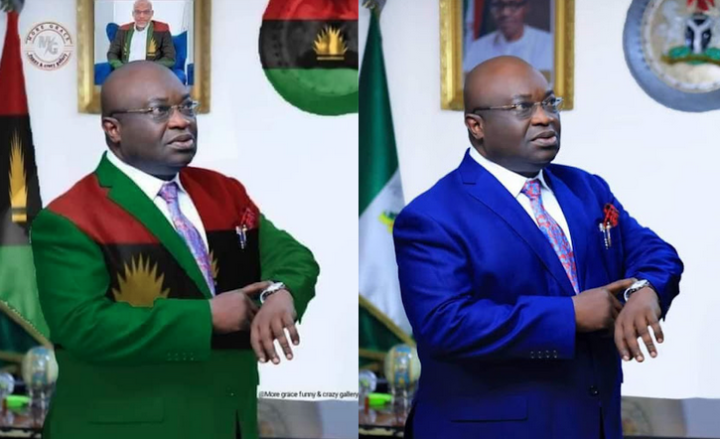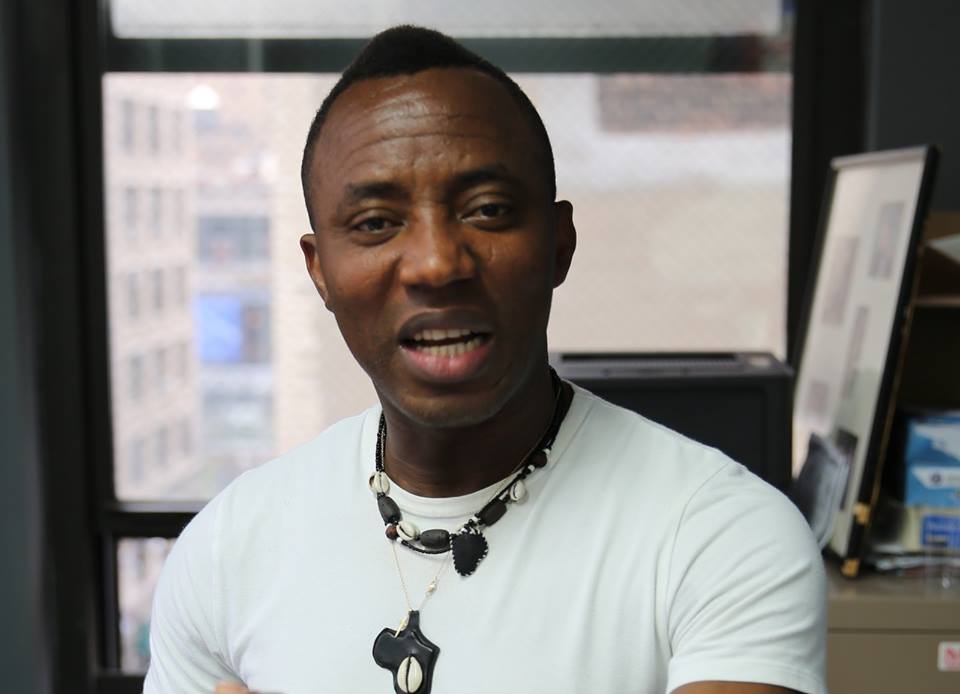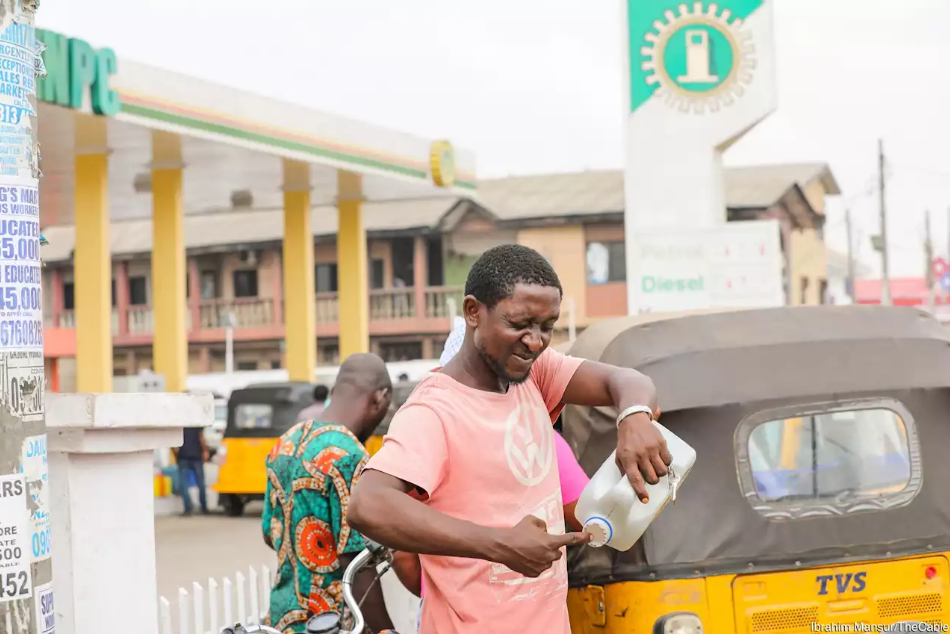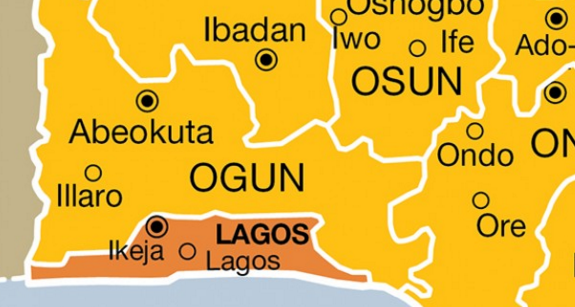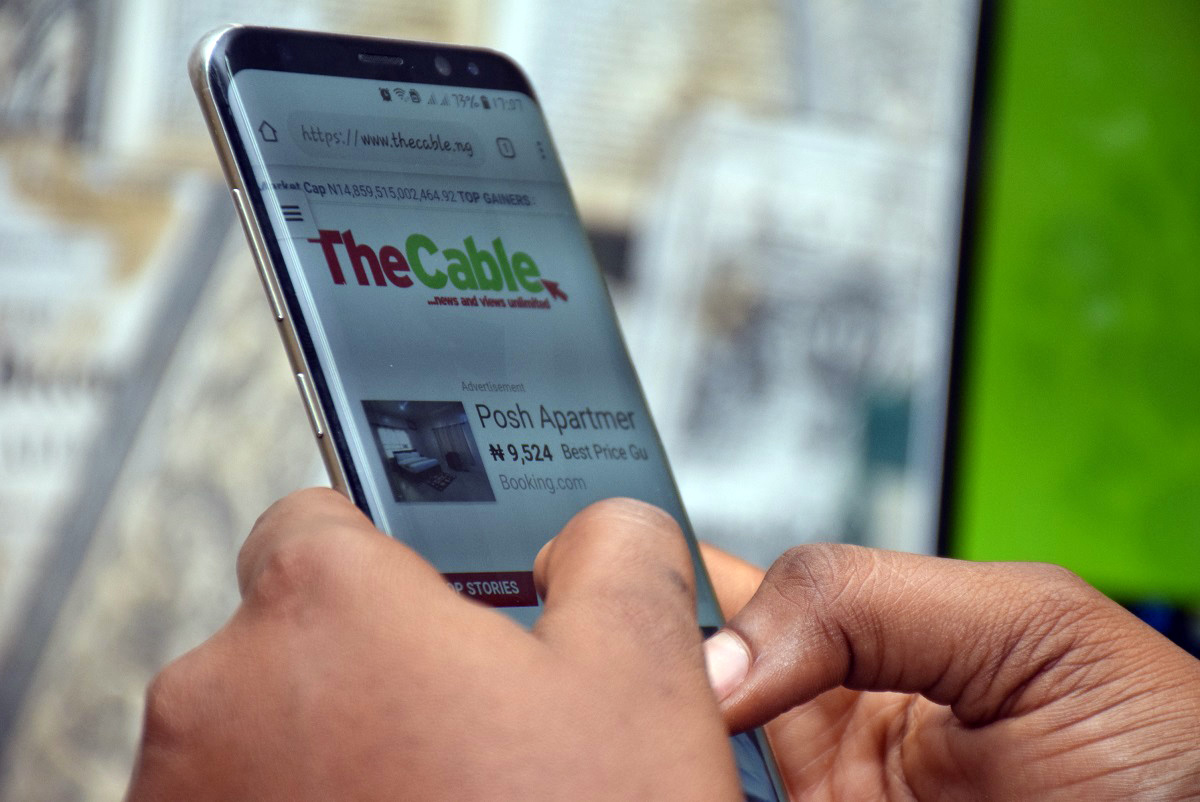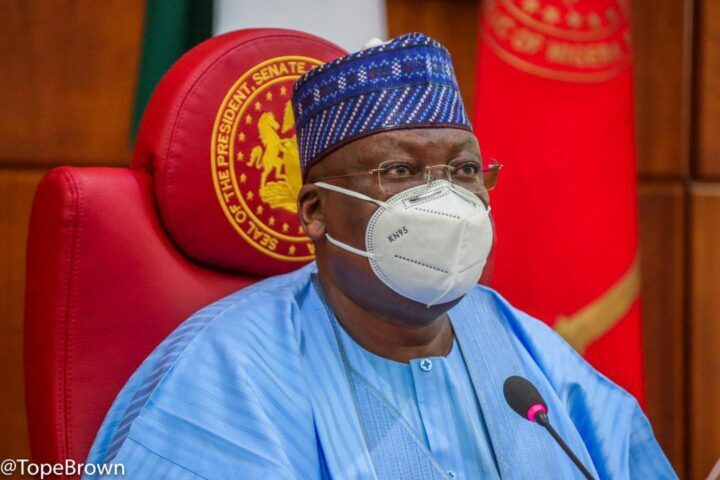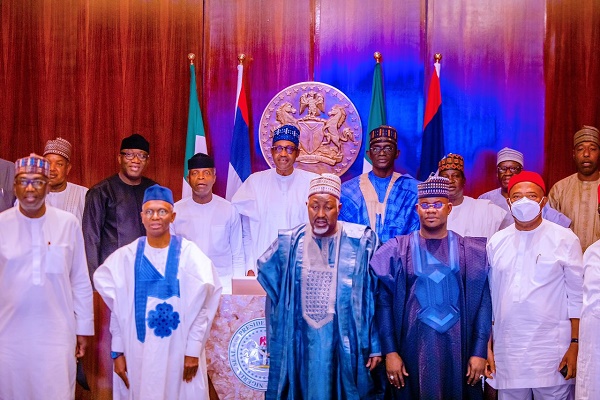The Indigenous People of Biafra (IPOB), a separatist group in Nigeria, is pushing for the establishment of a sovereign state for the people of the south-east extraction. The group’s motivation to exit the Nigerian federation is due to years of perceived marginalisation. The claims of disenfranchisement partly stem from political appointments and developments since the end of the civil war in 1970.
The secessionist movement was first championed by the late Odumegwu Ojukwu, the military governor of the Eastern region who served between 1966 and 1967. The clamour for secession led to a civil war between Biafra and Nigeria spanning about three years. No less than a million Igbos lost their lives during the war, with the Nigerian government emerging victorious.
In 1999, the agitation for secession was taken over by the Movement for the Actualisation of the Sovereign State of Biafra (MASSOB), another entity from the south-east, led by Ralph Uwazuruike. In 2012, IPOB was founded by Nnamdi Kanu, emerging as a prominent group seeking the actualisation of Biafra.
The separatist campaign peaked when President Muhammadu Buhari came into power in 2015. The Buhari-led administration has been accused of being “hostile” towards the south-east. IPOB, on many occasions, has alleged that the federal government plans to subjugate the Igbos through military operations in the geopolitical zone. Kanu has also repeatedly criticised the federal government for refusing to hold a national referendum to determine the country’s future.
Advertisement
CONFLICT BETWEEN IPOB AND THE NIGERIAN GOVERNMENT
IPOB resorted to threats of election boycott and violence to push for a referendum on Biafra. These threats pitched the group against the Nigerian government, which accused its members of trying to cause division in the country. Consequently, Kanu was arrested in 2015 on a six-count charge bordering on treasonable felony, managing an unlawful society, publication of defamatory matter, illegal possession of firearms and improper importation of goods.
He was charged alongside two other IPOB members, Benjamin Madubugwu and David Nwawuisi. But on November 9, 2016, the charges were amended to 11 counts with the inclusion of treason and some other offences. However, a federal high court in Abuja revoked six out of the eleven-count charges in 2017.
Advertisement
He was detained for over a year and released on bail in April 2017 for health reasons.
Kanu’s bail was on the condition that he must not hold rallies, must not grant interviews, must not be in a crowd of more than ten people, and must provide three sureties in the sum of N100 million each. He was also asked to deposit his Nigerian and British passports with the court and provide reports on his health and treatment progress monthly.
However, he jumped bail in September 2017 after going into hiding during a military operation in the south-east, where his country home in Abia state was invaded.
Kanu was later sighted in Israel in 2018, where he had threatened to return to Nigeria “with hell”. As a result of his continued absence in court, his bail was revoked by an Abuja federal court with an arrest warrant issued against him.
Advertisement
FORMATION OF EASTERN SECURITY NETWORK (ESN)
Kanu was resolute in his castigation of the Nigerian government, and his followers had also increased in his absence. At the same time, the agitation continued to grow stronger.
In December 2020, the group launched its security outfit dubbed the Eastern Security Network (ESN). Kanu said ESN was formed to combat terrorism and protect south-easterners from “criminal activities”.
The IPOB leader maintained that the failure of south-east governors to secure the lives and property of the Igbo people led to the formation of the security network. However, after establishing the group, there was a spike in attacks against security and government infrastructure in the region.
Advertisement
The police have repeatedly linked the attacks to IPOB, but the group has denied involvement. IPOB, in turn, accused the Nigerian government of sponsoring unrest in the south-east in a bid to pin the deeds on its members.
The group alleged that 20,000 of its members have been victims of the extra-judicial killings by the Nigerian security agencies.
Advertisement
LEVERAGING SOCIAL MEDIA
As part of its campaign against the Nigerian government, IPOB has deployed disinformation to drive its secessionist agenda. Radio Biafra was established to amplify its message, reaching supporters within and outside Nigeria. In some of its messages, the group refers to the country as “a zoo” and “animal kingdom”.
Advertisement
The group also leverages social media platforms to whip up sentiments against the government and its critics with the goal of garnering sympathy from the public. Social media has also presented opportunities for misinformation to spread fast and reach a wider audience; hence, a large percentage of IPOB followers are found on different platforms, consistently sharing and spreading their ideologies and, most times, fake news.
There is ample evidence of manipulation of public discourse and opinion. IPOB has a Facebook and Twitter network that regurgitates what a central authority dishes out. There are also individual accounts and groups dedicated to its cause on social media. Their propaganda is a continuum built upon small pieces of information with the aim of yielding a certain slant that suits their narratives.
Advertisement
Many of the accounts post the same contents; the initial post originates from an account, and the others spread and amplify them within a short period. Also, most accounts have the same profile picture — mostly that of Kanu in Igbo traditional attire.
A large IPOB diaspora also shares the group’s disinformation in other countries. The group has also employed the services of an American lobbying firm, BW Global Group, to help promote IPOB to achieve its secession objective. The one-year deal took effect from March 1, 2021, and cost Kanu and IPOB $750,000.
DISINFORMATION CAMPAIGN
To drive home its agenda, IPOB has over the years shared fake reports of world leaders supporting the Biafra agenda. Fabricated and altered texts accompanied with images of the world leaders are shared on social media, so as to create the impression that they identify with the movement.
One such post was titled ‘Russia warns Nigeria about Biafra’. The post shared on Facebook claimed that Russian President Vladimir Putin warned that Nigeria would not have peace unless it granted the demands of Biafrans. The post was shared by one Anyaeche Chukwuma.
The post garnered 96 shares. Some of the accounts that shared the post were Biafra-affiliated groups, including Biafra News Today. An online search showed that the post was first uploaded by an account of Obinna Felix Attah in March 2021.
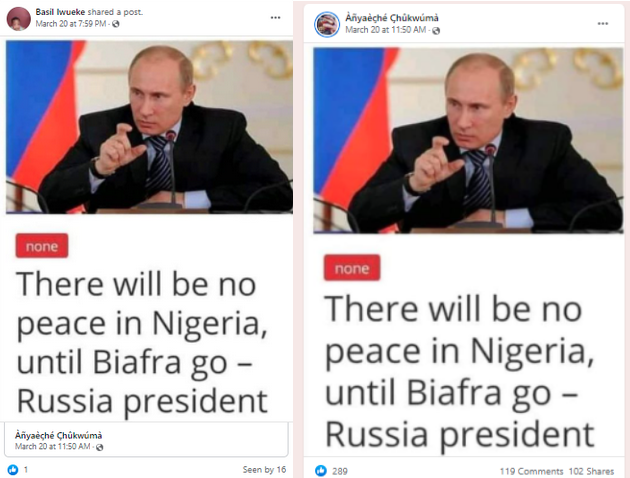
In January 2021, a post by African Voice TV claimed that Ivory Coast President Alassane Ouattara had asked the UN to declare Biafra as an independent state. The report was shared and retweeted by IPOB-affiliated pages.
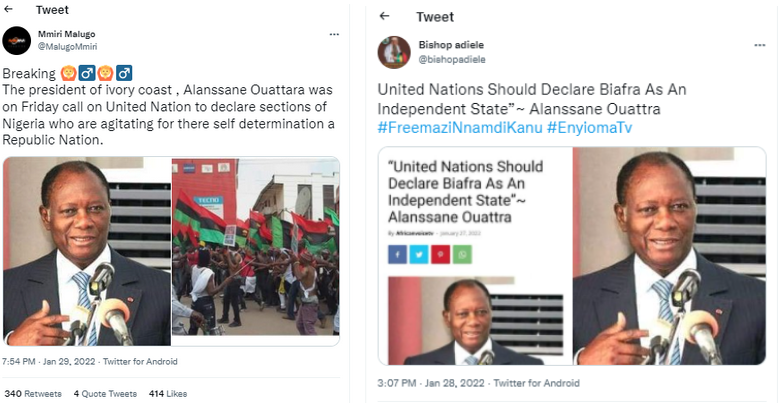
Another report, ‘India PM asks Nigeria to pay attention to Biafra’, by African Voice Network, claimed that India’s Prime Minister Narendra Modi declared his support for IPOB at a session of the UN general assembly.
IPOB-affiliated groups retweeted the claim, but it was found that the date and time where the Indian PM purportedly made the remark was not mentioned. Past speeches delivered by the Indian PM at sessions of the UN general assembly were also reviewed, and none referred to the secessionist group.
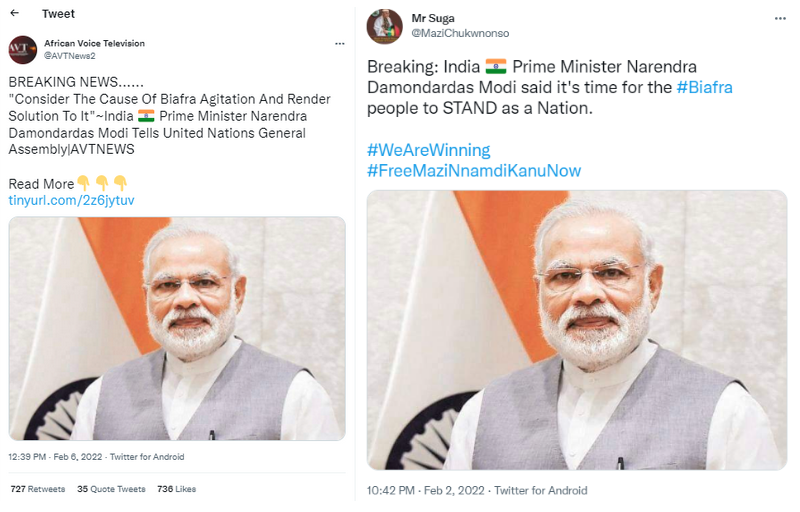
The post was also shared on several blogs and on Youtube.
Elsewhere, another post claimed that former President Olusegun Obasanjo expressed his admiration for Nnamdi Kanu in 2021. The former president was said to have hailed Kanu’s resilience.
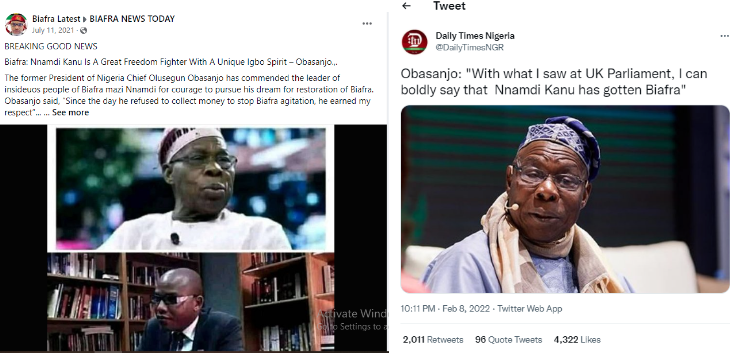
Another viral post on Twitter, in February 2022, was also attributed to the former president. But Obasanjo has since denied the statements.
The group also capitalised on President Muhammadu Buhari’s medical vacation to the UK in 2016 by claiming that he was dead. The posts alleged that in the absence of Buhari, Nigeria was under the leadership of one Jubrin from Sudan. Nnamdi Kanu first peddled the rumour with various pictures and videos to back the claim, which has been proved to be false. He also made use of live Facebook broadcasts and videos to promote the claim.
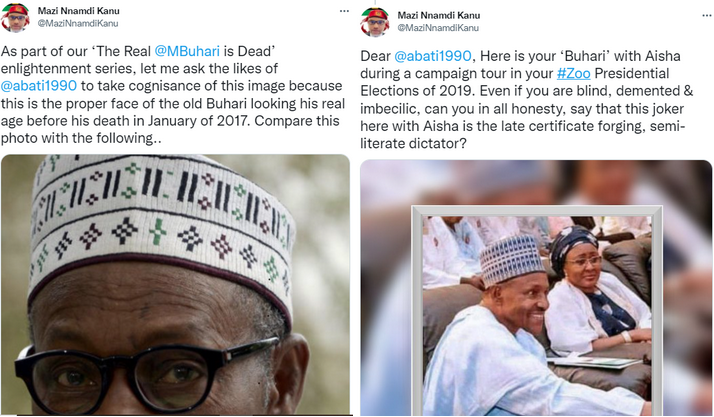
A viral post also accused the Nigerian government of mislabelling IPOB members as terrorists. The post was attributed to Chris Smith, a United States house of representatives member. Although Smith, in 2018, expressed concern about reports of the harassment of opposition leaders in Nigeria during the 2019 general election, the US lawmaker was however not quoted to have made the purported claim.
A few other unverified claims against people seen as anti-Biafra, which have been shared many times, have been archived here.
A common factor with all the fabricated posts was no mention of the date or venue where the world leaders purportedly made the statements. Also, no credible news medium in the country reported them.
USE OF ALTERED IMAGES
Additionally, popular Igbo personalities have been depicted as supporting the Biafran struggle by wearing the group’s paraphernalia. These images are largely edited and misleading.
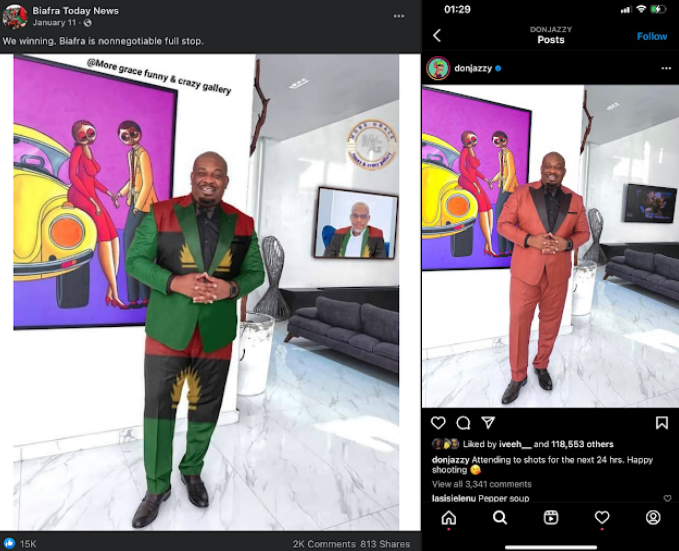
Altered image of Don Jazzy vs original image shared on his official Instagram page
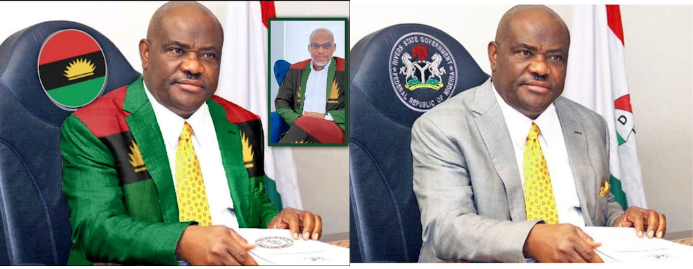
Altered Image of Nyesom Wike, Rivers state governor, in Biafran attire vs real image shared as far back as 2018.
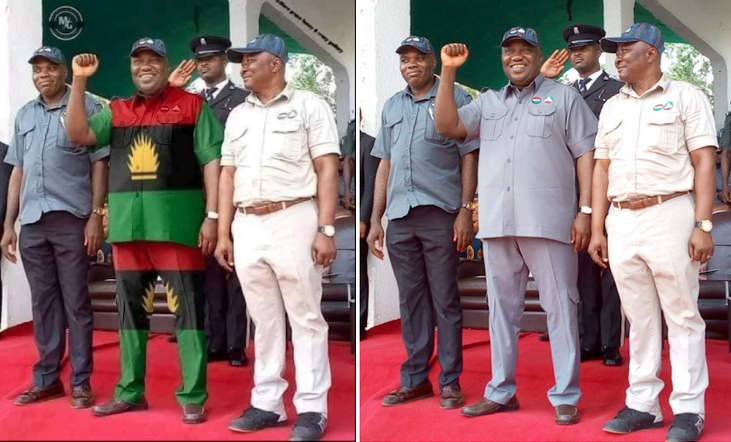
Reverse Image search shows this image of Ifeanyi Ugwuanyi of Enugu state has been shared in an article by Daily Post in 2018.

Reverse Image search of this image of Willie Obiano, ex-governor of Anambra, made by a Biafran-affiliated account shows it was first posted in November 2016 (source: Tineye)
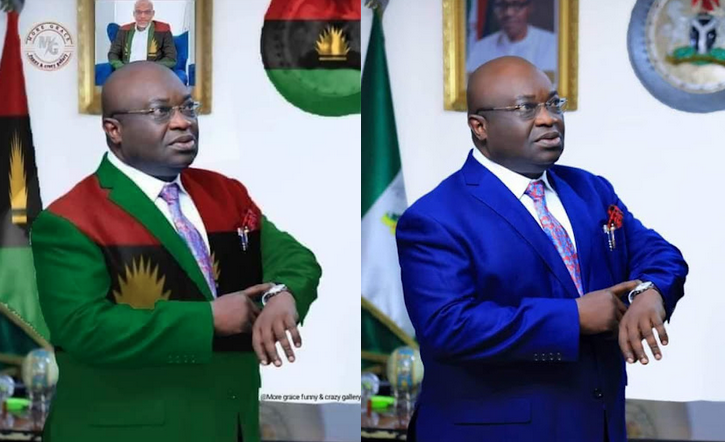
Altered image of Okezie Ikpeazu, governor of Abia state, wearing Biafra clothing vs original image
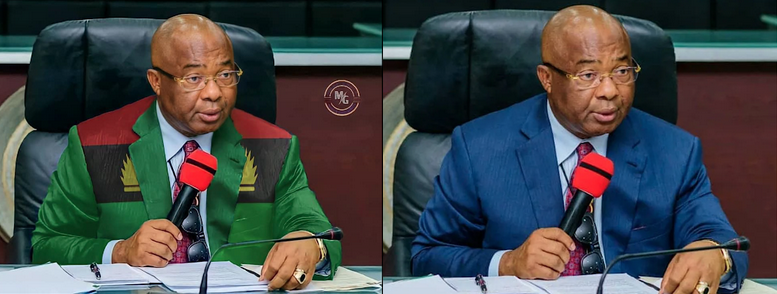
Edited image vs original image
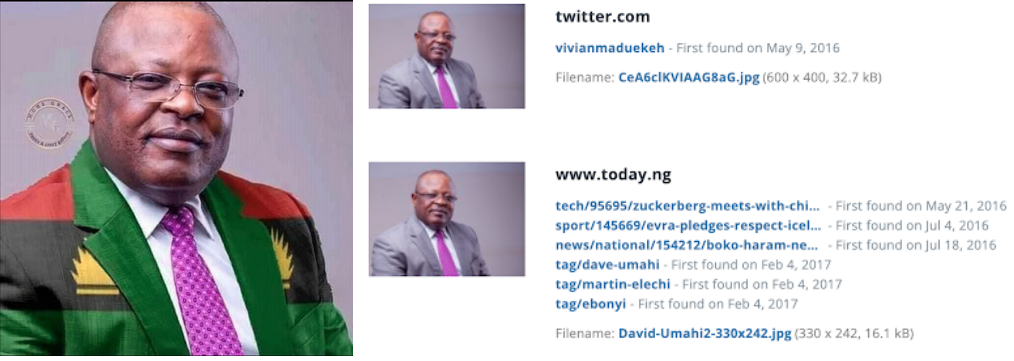
Reverse image search on Tineye shows that the original image of Dave Umayi, governor of Ebonyi state, has been in circulation since 2016.
COORDINATED MESSAGES ACROSS MULTIPLE PAGES
Several pages are also dedicated to posting polarising content about Biafra. Three of the accounts, Biafra Newspaper, Eastern Breaking News, and Biafran Update, are not run from Nigeria. The top locations are the UK, Turkey, and one account from Equatorial Guinea.
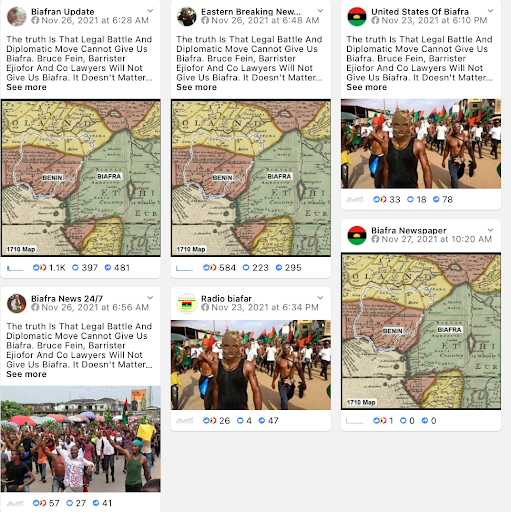
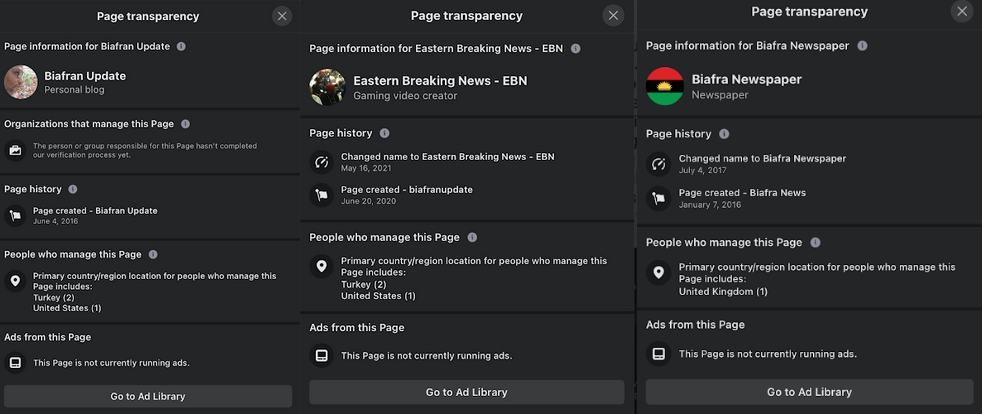
Another popular narrative that has been shared by Biafra-related pages since the Russian invasion of Ukraine states that “Russia never had black slaves”.
Different pages have shared this message in different groups since the invasion. It states that Russia did not colonise any African country or enslave black people. The first publicly available post with this message was posted on Ntemfacofege (a public group run from Cameroon) on February 26, 2022, before making its way to Biafran pages.
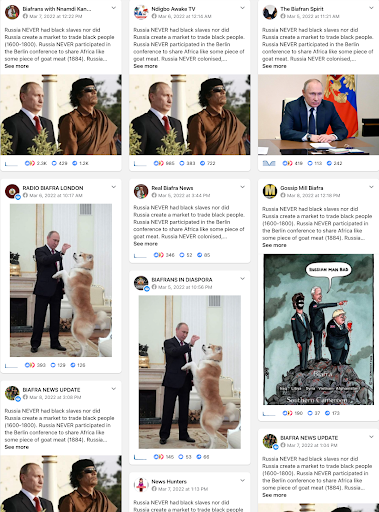
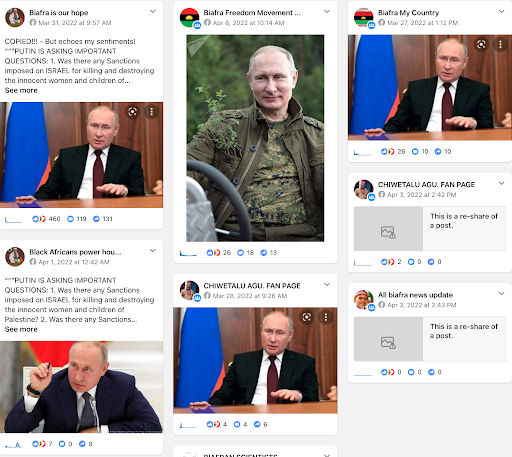
The posts on Russia appeared to have been shared to buttress IPOB’s claim that Russia supports Biafra and that the West is against the secessionist agenda.
Between March 6 and 7, 2022, a memo allegedly from the management of the Federal University Dutsinma (FUDMA) was syndicated by accounts in the Biafra watchlist. The memo reportedly banned Christians from Sunday service and gave directives for Christian activities to be held on Tuesdays and Thursdays between 6 pm and 7 pm. But the memo was later debunked by the school management.
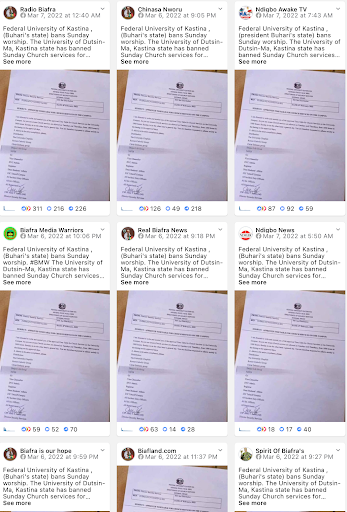
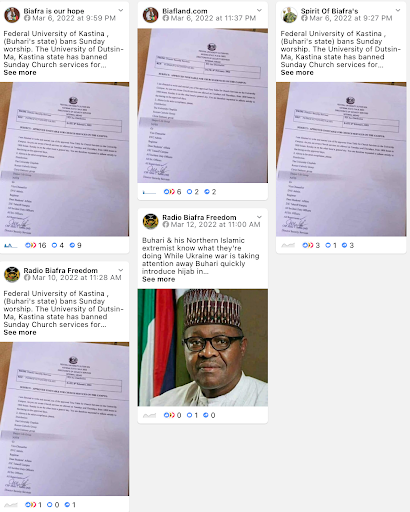
Screenshot of misinformation shared by pages

A group of accounts also shared the same message and images on Twitter. The major actors in this network were @BiafranTweets which was retweeted by 289 accounts, followed by @stancity44 and@BIAFRAEzinne.
An IPOB page, Radio Biafra Freedom, also shared a video discussing the insecurity in Nigeria with a misleading caption claiming that the Nigerian government is sending money to support Ukraine against Russia. The information is not verifiable, although the Nigerian government blocked its citizens from being recruited into the war. This same account shared content surrounding the Nigerian civil war. It ended the post by calling Russia’s invasion an act of self-defence against colonisation by NATO.
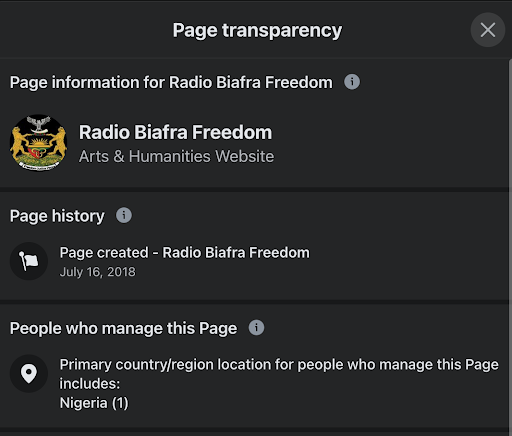
The page was created in 2018 and is run from Nigeria.
Biafra-affiliated pages have also claimed that the UK is in recession and has to make deals with the Middle East and Nigeria to tackle its fuel crisis. This information has been debunked by independent fact-checkers from Africa Check. This misinformation was first shared by Carol Munday, a Facebook user.
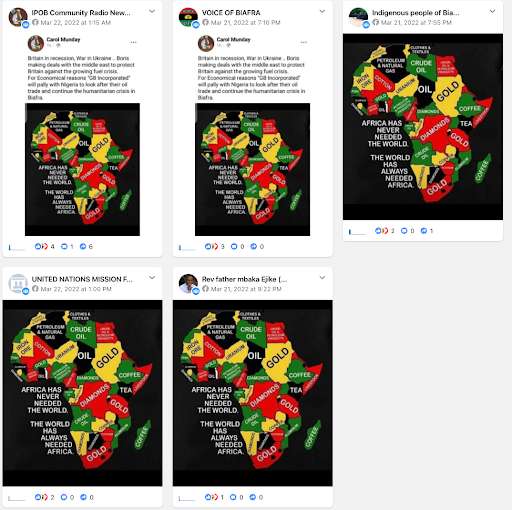
HOW DISINFORMATION AFFECTS NIGERIA
The ever-increasing calls for secession have been threatening Nigeria’s unity and affecting the economy of the south-east. The disinformation campaign employed by IPOB has worsened the ethnoreligious division in the country and caused more insecurity in the affected zone. Anyone who speaks in support of the Nigerian government or against the group is categorised as anti-Biafra and faces criticism from the secessionists.
Employing this narrative, the group has been able to get young men in the south-east to attack government institutions like police stations, security checkpoints, and INEC offices and facilitate jailbreaks. The propaganda leads to what the media fears may become an insurgency in the region. The federal government has also not relented in its crackdown on the group.
In December 2020, Nigeria was listed among countries that violate religious freedom by the United States. The federal government had attributed this to the “misleading” campaign by IPOB. The presidency accused IPOB of paying American lobbyists to “spread falsehood” about Nigeria. The country was eventually removed from the list.
Also, part of the tools used by the group to show its blatant disregard for the Nigerian authority is the sit-at-home order. The order was employed to add pressure to their quest to actualise an independent nation of Biafra.
The sit-at-home order was first introduced to acknowledge Biafra heroes who died in the Nigeria-Biafra War. But it was later extended to days when Nnamdi Kanu was to appear in court for his trial. The order also became a tool to wield control over the region. Those who do not comply are forcefully dealt with.
The sit-at-home order was suspended in early 2022, but some parts of the zone have continued to observe the ruling out of fear– which further affects business activities in the area.
On democratic processes, in 2017, the group warned that it would not allow governorship polls in Anambra state. It also threatened to boycott the 2019 elections. But it later relented its stance. But the fear of the group has caused a growing voter apathy during recent elections in the zone.
However, Emma Powerful, IPOB spokesman, denied that the group uses disinformation to advance its secessionist agenda.
Powerful said the group does not associate itself with rumour-mongers and is not affiliated with accounts that share fake news.
“The point is that not every profile you see Nnamdi Kanu’s picture means they support Biafra. Some of them are enemies, working with the government, the DSS, so that people can be thinking that they are real Biafra platforms. We know those in support of Biafra and those trying to cause confusion in the name of IPOB. Most of the information you see on social media, some of them are not real. We know what we are passing through. They are blackmailers,” Powerful said.
On posts shared by Nnamdi Kanu, which have been flagged as fake, the IPOB spokesperson insisted their leader had no reason to lie but only to speak the truth.
“It is not supposed to be hard to understand the real ones and real news unless you are a double-standard person; someone that doesn’t like IPOB. As I told you, so many people use Nnamdi Kanu’s pictures to propagate their fake news so that people may think they are real,” he said.
“IPOB has platforms like Radio Biafra and IPOB community radio that is real. But these DSS people use some of these accounts to deceive the public.”
On allegations that IPOB is behind the increasing wave of violence in the south-east, Powerful maintained that the group is made up of peaceful individuals.
“We protect our people, our women in the forest, in the bushes, and every other place. Those people are our enemies and they cannot change our narrative. We are not deterred. We know what we are looking at and we are going to get it,” he said.
But despite Powerful’s rebuttal, the disinformation propagated by pro-IPOB groups has not in any way reduced. As Nigeria prepares for the 2023 elections, more false stories against the Nigerian government are still being churned out by supporters of the group — particularly news on how the Fulanis, allegedly backed by the government, are gearing towards subjugating other ethnic groups through the imposition of their candidate in the forthcoming elections.
This article was produced with mentorship from the African Academy for Open Source Investigations (AAOSI), to tackle disinformation that undermines our democracies, as part of an initiative by the International Centre for Journalists (ICFJ) and Code for Africa (CfA). Visit http://academy.africa/aaosi for more information.
Add a comment
